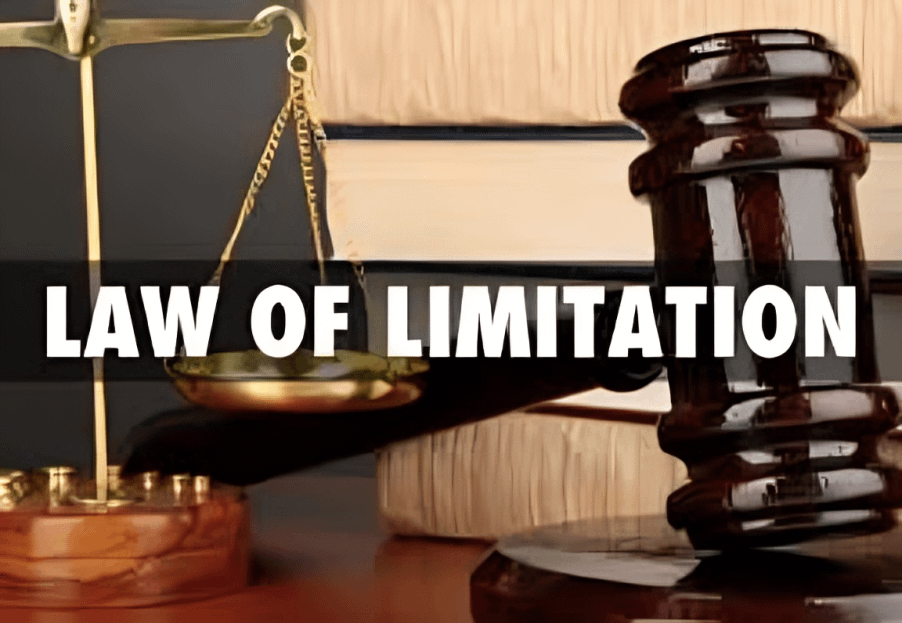SAKSHI PARDHE
31ST MASRCH 2025

The Law of Limitation is a legal principle that prescribes the maximum time period within which legal proceedings must be initiated after the occurrence of a particular event. It is designed to ensure that disputes are resolved within a reasonable time frame, preventing indefinite uncertainty.
Objectives:
- Prevent fraudulent and stale claims where evidence may no longer be reliable.
- Encourage prompt legal action to maintain legal certainty.
- Protect defendants from being unfairly prosecuted or sued after a long delay.
Key Provisions in the Law of Limitation (India & Global Perspective)
A. The Limitation Act, 1963 (India)
The Limitation Act, 1963 governs the time limits for filing different types of legal cases in India. It categorizes cases as follows:
(i) Civil Cases
| Type of Case | Limitation Period | Starting Point |
|---|---|---|
| Breach of Contract | 3 years | From the date of breach |
| Money Recovery (Debt, Loans, Promissory Notes, Cheques, etc.) | 3 years | From the date of default |
| Property Disputes (Adverse Possession, Mortgage Claims, etc.) | 12 years | From the date of possession/adverse claim |
| Specific Performance of a Contract | 3 years | From the date of refusal |
| Torts (Defamation, Negligence, etc.) | 1 year | From the date of injury |
(ii) Criminal Cases
| Type of Offense | Limitation Period |
|---|---|
| Serious Crimes (e.g., Murder, Rape, Corruption, Terrorism) | No limitation (can be prosecuted anytime) |
| Economic Offenses (e.g., Money Laundering, Fraud, Tax Evasion, Corporate Crimes) | Depends on the offense; usually 3-10 years |
| Minor Offenses (e.g., Defamation, Public Nuisance) | 1-3 years |
(iii) Special Cases: Corporate Frauds & Cyber Fraud
| Case Type | Limitation Period | Law Applicable |
|---|---|---|
| Corporate Fraud (Financial Misrepresentation, Insider Trading, etc.) | 3-10 years | Companies Act, SEBI Act, Limitation Act |
| Cyber Fraud (Hacking, Data Breach, Phishing, Financial Cybercrime) | 3-7 years | IT Act, IPC, Limitation Act |
| Banking Fraud (Loan Defaults, Cheque Bouncing, Money Laundering) | 3-10 years | Banking Laws, RBI Guidelines, Limitation Act |
Limitation in Corporate Fraud Cases
A. Corporate Frauds Under the Companies Act, 2013
- Section 447 of the Companies Act, 2013 deals with frauds committed by corporate entities.
- Limitation Period: 3-10 years, depending on the offense.
- In fraud cases, the period starts from the date of discovery, not from the date of occurrence.
Key Judicial Precedents:
- SEBI v. Sahara India: Extended the limitation period as fraud was discovered much later.
- N.N. Global Mercantile v. Indo Unique: Held that fraudulent concealment extends the limitation period.
B. Banking & Financial Frauds
- Governed under SARFAESI Act, RBI Guidelines, and Banking Regulations Act.
- If fraud is detected by banks, the limitation period generally starts from the date of detection rather than the occurrence.
Limitation in Cyber Fraud Cases
A. Cyber Fraud under the IT Act, 2000 & IPC
Cyber frauds like hacking, identity theft, financial fraud, and data breaches are covered under:
- Section 43, 66, 66C, 66D of the IT Act, 2000
- Sections 406, 419, 420 IPC (for cheating and criminal breach of trust)
Limitation Period:
- For general cyber frauds (phishing, hacking, identity theft) → 3 years
- For financial cyber frauds (bank fraud, cryptocurrency fraud) → Up to 7 years
B. Discovery Rule in Cyber Fraud
- Unlike traditional crimes, cyber frauds often remain undetected for years.
- Courts in India and globally follow the Discovery Rule, where the limitation period starts from when the fraud is discovered, not when it occurred.
Example Case:
- Naresh Govind v. State of Maharashtra: The Bombay HC ruled that limitation begins when the victim realizes the fraud, not when the hacker commits it
Exceptions & Extensions to Limitation Period
A. Fraud Exception
- If fraud is concealed, the limitation starts from the date of discovery.
- Courts can allow extensions if the fraudster deliberately hid the fraud.
B. Doctrine of Continuous Cause of Action
- If an offense or wrongdoing continues over time (e.g., misappropriation of funds over multiple years), the limitation resets with each wrongful act.
C. Disability & Special Circumstances
- If a person is mentally incapable or a minor, the limitation starts when they regain capacity or turn 18.
- In cases of war or national emergency, limitation may be suspended.
Global Perspective on the Law of Limitation
| Country | Civil Claims | Criminal Claims | Special Provisions |
|---|---|---|---|
| USA | 3-10 years (depends on state law) | No limitation for serious crimes | Discovery rule applies to fraud |
| UK | 6 years (contract/tort) | No limit for murder, fraud has flexible limits | Special rules for banking fraud |
| EU (General Data Protection Regulation – GDPR) | 6 years for data breaches | No limit for terrorism and serious crimes | Cyber fraud limitation extends with data breach discovery |
| Singapore | 6 years (contract/tort) | 10 years for fraud | Strict timelines for corporate fraud |
Conclusion
The Law of Limitation is a crucial aspect of legal systems worldwide, preventing delayed justice and ensuring fairness. However, special provisions exist for corporate frauds and cyber frauds, allowing extensions based on discovery.